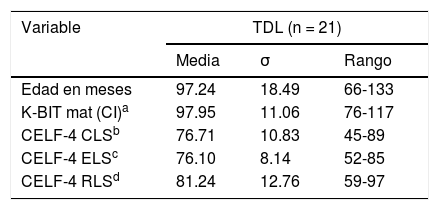El presente estudio analiza la relación entre el trastorno del desarrollo del lenguaje (TDL) y la presencia de síntomas emocionales o problemas con los compañeros/as. Concretamente, se estudia el riesgo de sufrir victimización en la población con TDL, y su relación con los problemas del lenguaje.
MétodoLa investigación se realizó con una muestra de 42 participantes (21 con TDL; 21 con desarrollo típico (DT), cuyos padres/madres cumplimentaron el Cuestionario de Dificultades y Capacidades (versión en español del SDQ, Goodman, 1997) y un cuestionario creado ad hoc sobre Victimización General y Victimización Específica por el Lenguaje. En ellas se analizaron las variables Síntomas Emocionales, Problemas con los/as Compañeros/as, Victimización General y Victimización Específica por el lenguaje.
ResultadosLos resultados revelaron diferencias estadísticamente significativas entre los grupos en cuanto a Síntomas Emocionales, Problemas con los/as Compañeros/as y en Victimización específica por el lenguaje. Sin embargo, no ocurrió así con Victimización General.
ConclusionesLos resultados de este estudio indican que el tener TDL estaría relacionado con sufrir manifestaciones emocionales negativas y con el riesgo de sufrir victimización específica a causa de los déficits en el lenguaje.
The present study aims to analyse the relationship between developmental language disorder (DLD) and the presence of emotional symptoms or problems with classmates. Specifically, it seeks to analyse the risk of suffering bullying in children with developmental language disorder (DLD), and its relation to language problems.
MethodThe study was carried out with a sample of 42 participants (21 with DLD; 21 with Typical Development-TD), their parents were asked to complete the spanish version of the Difficulties and Capabilities Questionnaire (Goodman, 1997) and a survey about bullying and linguistic bullying. We assessed Emotional Symptoms, Problems with Partners, bullying and Linguistic bullying variables.
ResultsThe results revealed statistically significant differences between the groups regarding Emotional Symptoms, Problems with Partners and in Linguistic bullying. However, this did not happen with General bullying.
ConclusionsIn light of these results, we conclude that language problems play a crucial role in the risk of linguistic bullying, a specific form of bullying.











